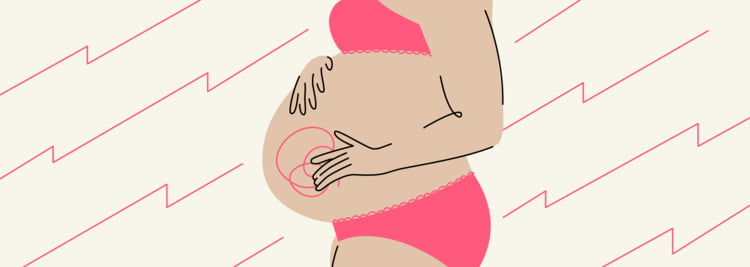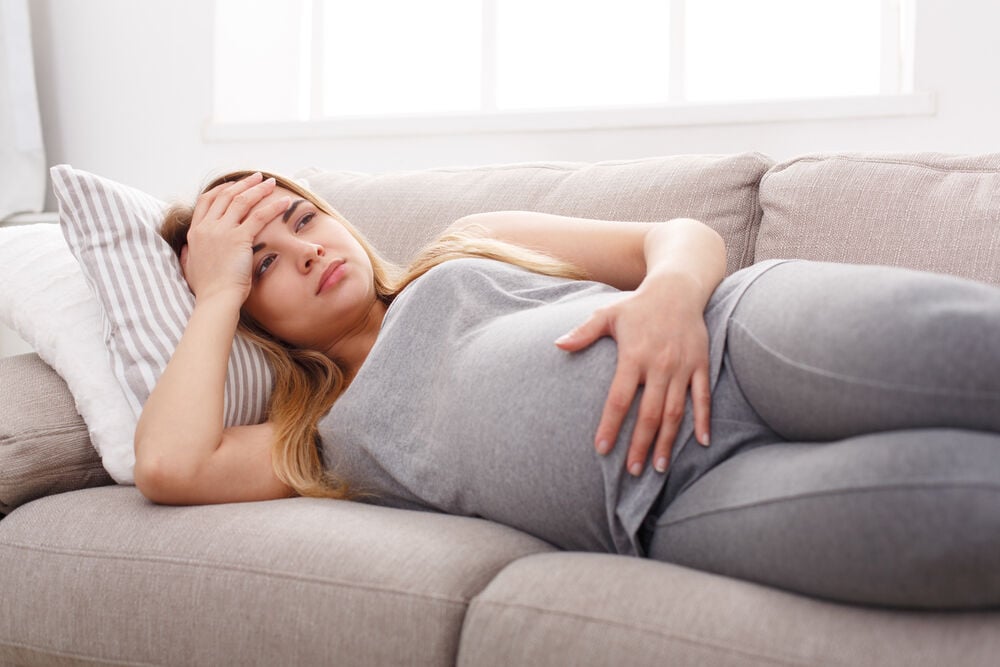Stomach pain during pregnancy can be the result of countless things, ranging from mild, harmless ailments to serious conditions requiring medical attention. Learn how to diagnose your symptoms and what steps you should take to address them.
-
Tracking cycle
-
Getting pregnant
-
Pregnancy
-
Help Center
-
Flo for Partners
-
Anonymous Mode
-
Flo app reviews
-
Flo Premium New
-
Secret Chats New
-
Symptom Checker New
-
Your cycle
-
Health 360°
-
Getting pregnant
-
Pregnancy
-
Being a mom
-
LGBTQ+
-
Quizzes
-
Ovulation calculator
-
hCG calculator
-
Pregnancy test calculator
-
Menstrual cycle calculator
-
Period calculator
-
Implantation calculator
-
Pregnancy weeks to months calculator
-
Pregnancy due date calculator
-
IVF and FET due date calculator
-
Due date calculator by ultrasound
-
Medical Affairs
-
Science & Research
-
Pass It On Project New
-
Privacy Portal
-
Press Center
-
Flo Accuracy
-
Careers
-
Contact Us
Stomach Pain During Pregnancy: Common Causes and Treatments


Every piece of content at Flo Health adheres to the highest editorial standards for language, style, and medical accuracy. To learn what we do to deliver the best health and lifestyle insights to you, check out our content review principles.
What causes abdominal pain during pregnancy?
More often than not, abdominal pain during pregnancy is perfectly normal and caused by the changes your body undergoes as part of gestation.
If you’re a first-time mom, you’ll understandably be a bit warier of stomach pain, and you may want to consult your doctor. If so, make a note of the type of stomach pain you’re experiencing. The more accurately you describe these feelings of discomfort, the easier it’ll be for them to pinpoint the cause.
Expanding uterus
As your baby grows, so does your uterus. You may experience twinges, aches, and minor discomfort, which some liken to mild menstrual cramps. Applying warm compresses to the area may provide relief. Deep breathing and gentle stretching can relieve abdominal tension.
However, if you begin having severe cramps accompanied by spotting or bleeding, seek medical attention immediately.
Constipation and gas
The rate at which your body digests and processes food slows down in order to extract the greatest amount of nutrients for your baby. Constipation and gas are especially common in the first trimester, but they can last the whole nine months.
Lower back pain is a strong indication of constipation, as well as having infrequent bowel movements. Dry, hard-to-pass stools are another sign of constipation.
Take a quiz
Find out what you can do with our Health Assistant
Constipation and gas are especially common in the first trimester, but they can last the whole nine months. Lower back pain is a strong indication of constipation, as well as having infrequent bowel movements.
Gas pains occasionally mimic chest pains and occur higher in the stomach. Calcium antacids relieve gas, as can massaging your stomach. Simply use the tips of your fingers and gently press, as if typing on a keyboard. To relieve gas pain lower in the stomach, try “bicycling” your legs to help move it along.
It’s important to stay hydrated while pregnant, and if you’re constipated you need to drink even more water than usual. Doing so softens your stools, making them easier to pass. Fruit juice, especially apple juice, can serve as a natural remedy, too.
Stretching skin
Stretch marks along your hips and belly will inevitably appear, and for some the rapid growth of skin can be painful. Moisturize with lotions containing alpha-hydroxy acids and avoid gaining more weight than your doctor recommends. Excessive weight gain tends to create more severe stretch marks.
Braxton-Hicks contractions

Also known as false labor, these contractions serve as a precursor to delivery. They might happen as early as the second trimester, but generally present in the third trimester. During Braxton-Hicks contractions, your abdomen tightens and contracts for 30 to 60 seconds (in rare cases, up to 2 minutes), then releases.
During Braxton-Hicks contractions, your abdomen tightens and contracts for 30 to 60 seconds (in rare cases, up to 2 minutes), then releases.
Unlike labor contractions which happen at regular intervals, Braxton-Hicks contractions are sporadic. As they’re more uncomfortable than painful, consider practicing the breathing techniques you learned in childbirth classes to ease the symptoms.
If the contractions grow stronger seek medical attention immediately. You could be going into early labor.
Gallbladder issues
While pregnant, your body produces higher levels of progesterone to relax your muscles. A typical side effect is that your gallbladder cannot release bile as quickly, creating gallstones.
Those with a history of developing gallstones are more susceptible to them during pregnancy. They present as a sharp, stabbing pain in the side of your abdomen accompanied by nausea and vomiting, especially after waking up. Gallbladder issues tend to be confused with morning sickness, so consult your physician if you think you’re at risk for gallstones. An ultrasound can confirm this.
Treating stomach pain during pregnancy
How stomach pain is treated depends on what’s causing it. For example, indigestion can be treated with antacids or a brisk walk, while the soreness of an expanding uterus responds to warm compresses.
Can stomach pain be a sign of something serious?
At times, stomach pain indicates a potentially serious condition. Never ignore sharp, stabbing stomach pains, especially if you begin spotting or bleeding. Seek help right away if you believe you’re experiencing any of the following:
Miscarriage
Miscarriage occurs for many reasons. Miscarriage generally occurs during the first trimester of pregnancy as the result of abnormal cell development. Symptoms include sharp cramps increasing in intensity, followed by spotting and bleeding.
If a miscarriage happens early enough, you may think you’re simply having a heavy period. The farther along you are, though, the higher your risk is for complications from miscarriage. If your body doesn’t fully pass the fetus and placenta, they will have to be removed.
Placental abruption
The risk of placental abruption is highest towards the end of pregnancy. It occurs when the placenta partially or fully separates from the uterine wall. Placental abruption is marked by sudden spotting and bleeding from the vagina and a sharp pain in the abdomen or lower back. Other symptoms include tenderness or a firm feeling in the uterus and rapid contractions.
Placental abruption is marked by sudden spotting and bleeding from the vagina and a sharp pain in the abdomen or lower back.
Without the placenta intact, a fetus won’t receive oxygen-rich blood and nutrients it needs. Instead, blood pools inside the uterus builds up a dangerous amount of pressure unless it exits through the vagina.
Seek immediate medical attention if you feel a pulling sensation, suddenly begin bleeding, or observe a swollen area on your baby bump.
Ectopic pregnancy
An ectopic pregnancy is when the fertilized egg implants anywhere besides the uterus, such as inside a uterine tube.
Women aged 35 to 44, as well as those suffering from endometriosis, are at greater risk for ectopic pregnancies, as are people who’ve had abdominal surgeries, abortions, tubal ligation, or who got pregnant while using an IUD for contraception.
An ectopic pregnancy is when the fertilized egg implants anywhere besides the uterus, such as inside a uterine tube. Sometimes, ectopic pregnancies rupture your uterine tube, resulting in vaginal bleeding.
Sometimes, ectopic pregnancies rupture your uterine tube, resulting in vaginal bleeding. This can cause lightheadedness, nausea, and a sharp, stabbing side pain that comes and goes. Some even report feeling pain in the neck or shoulder.
If you feel a sharp pain lasting for more than a few minutes, accompanied by bleeding, seek medical attention immediately.
Urinary tract infection
Urinary tract infections (UTIs) are pretty common during pregnancy, even if you’ve never had one before. The pressure placed on your bladder by your baby causes urine to leak, which can trap bacteria and create an infection.
Left untreated, a UTI may trigger a kidney infection, which in turn, could cause preterm labor and low birth weight. If you observe signs of a UTI, such as pain or burning when you pee, ask your doctor to prescribe pregnancy-safe medications to clear up the infection.
Preeclampsia
Preeclampsia is a condition that produces high blood pressure and protein (or ketones) in your urine. Other symptoms include swelling in your hands and feet or a painful tightness in your belly. Severe preeclampsia causes nausea, headaches, blurred vision, and pain in your upper right abdomen.
If you notice any of these symptoms, seek immediate medical attention. Preeclampsia can lead to malnourishment of your baby, along with cardiac problems and liver or kidney failure for you.
When to see a doctor
Although most stomach pains during pregnancy shouldn’t be concerning, others may have serious or even fatal consequences. If you experience unusual pain or bleeding, don’t hesitate to get help. Obstetricians often have after-hours nursing hotlines, staffed with trained professionals to assess your needs. Remember, it’s always better to be safe than sorry.


Hey, I'm Anique
I started using Flo app to track my period and ovulation because we wanted to have a baby.


The Flo app helped me learn about my body and spot ovulation signs during our conception journey.


I vividly
remember the day
that we switched
Flo into
Pregnancy Mode — it was
such a special
moment.
Real stories, real results
Learn how the Flo app became an amazing cheerleader for us on our conception journey.
References
History of updates
Current version (14 April 2020)
Published (03 October 2019)
In this article

Get your personal guide to pregnancy with the Flo app
-
Follow your baby's growth week by week
-
Get expert info on symptoms, safe foods, and more
-
Chat with other parents-to-be




